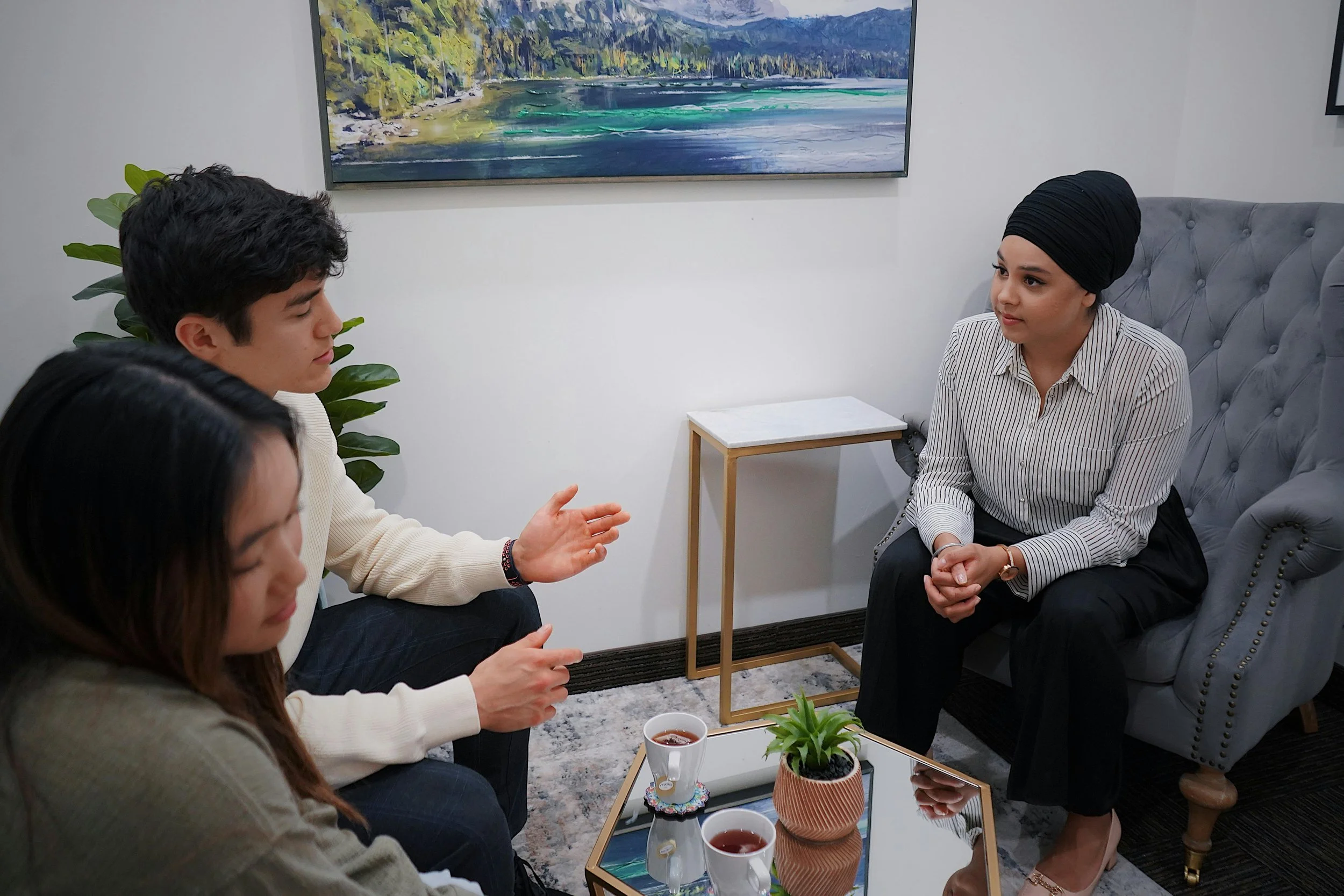How to Address and Overcome Trust Issues in Relationships
Alright, let’s talk about trust issues. If you’ve ever had a moment where your stomach knots up because your partner didn’t answer their phone, or you’ve gone into full-on Sherlock Holmes mode over a random comment they made on social media... know that you’re not alone. Trust issues happen—but they don’t have to derail your relationship. So, let’s dive into this and see what can be done about trust in your most important human connections.
What Are Trust Issues?
Trust issues are exactly what they sound like: doubts, fears, or insecurities about whether someone is being honest, faithful, or reliable. They can stem from past experiences like betrayal, dishonesty, or even childhood trauma. Attachment theory, a key idea in Emotionally Focused Therapy (EFT), explains that our early relationships shape how we connect with others. If you grew up with inconsistent or unreliable caregivers, you might develop an anxious or avoidant attachment style—and that can show up as trust issues in your romantic relationships.
But trust issues aren’t just about suspicion. They’re about feeling unsafe in an emotional bond. When trust is shaky, it’s hard to relax and let your guard down. And let’s face it—if you’re always on edge, it’s exhausting for both you and your partner.
Do Trust Issues Signal Trouble in Relationships?
Short answer? Not necessarily.
Trust issues are more of a “yellow flag”—a signal that something probably needs attention. They don’t mean your relationship is doomed, but they do indicate that there’s work to be done.
Think of trust as the foundation of your relationship house. If the foundation has cracks, the house might wobble in a storm (such as high levels of stress or anxiety). But with the right tools—and a little teamwork—those cracks can be repaired.
What matters most is how you and your partner handle trust issues together.
Are you both willing to put in the effort to rebuild trust?
Do you approach the problem with empathy and compassion?
If the answer is yes, then trust issues can actually become an opportunity to deepen your connection.
Practical Strategies to Overcome Trust Issues
Alright, now that we’ve covered the basics, let’s talk solutions. Overcoming trust issues takes time, patience, and a willingness to get vulnerable. Here are some strategies to get started:
1. Start with Self-Awareness
Before pointing fingers and playing the not-so-fun game called Find the Bad Guy, take a look inward. Ask yourself:
Where are my trust issues coming from?
Is this about my current partner, or is it tied to past experiences?
Understanding your own attachment style can be a game-changer.
Are you anxiously attached and constantly seeking reassurance?
Or are you avoidant and afraid to let your guard down?
Knowing this can help you communicate your needs more clearly.
2. Have an Honest Conversation
Once you’ve done some self-reflection, talk to your partner. Easier said than done, right? Here’s a conversation starter to break the ice:
“I’ve been feeling a bit insecure lately, and I think it’s connected to some old trust issues I’ve been carrying. I’d like to work through this with you because our relationship means so much to me.”
Notice how this focuses on your feelings rather than blaming your partner. It’s an invitation for teamwork, not a declaration of war.
3. Practice Transparency
If you’re the one with trust issues, let your partner know what actions help you feel secure. Maybe it’s texting when they’re running late or being upfront about plans with friends. On the flip side, if your partner is the one struggling, be patient and consistent. Small acts of reliability can go a long way.
4. Build Emotional Intimacy
Trust grows when you feel emotionally connected. That means sharing your thoughts, fears, and dreams in a meaningful way. Here’s a fun exercise: Set aside 20 minutes for a “connection check-in.” This isn’t just a casual chat but a dedicated time to really listen and connect. Take turns answering questions like:
What’s something that’s been on your mind lately?
How can I support you better?
What’s one thing you’ve been grateful for this week?
What’s something we could do together to feel closer?
These little moments of vulnerability aren’t just “nice-to-haves”; they’re the glue that holds your emotional bond together. They create a safe space for both partners to express themselves openly, which is essential for rebuilding trust and fostering deeper intimacy. Over time, these check-ins become a habit that nurtures your connection, even during stressful periods.
5. Manage Anxiety Together
Trust issues often come with anxiety. EFT suggests that instead of trying to “fix” anxiety, acknowledge it together. For example:
“I notice you get anxious when I’m out with friends. I want to understand how you’re feeling so we can work through it.”
This approach fosters empathy and turns a potential argument into a collaborative effort.
6. Set Boundaries Around Past Trauma
If past betrayals are fueling your trust issues, it’s important to address them without letting them control your current relationship. This might mean working with a therapist to process old wounds and create new, healthier patterns. Therapy can help you uncover the emotional scars left behind by those betrayals and provide tools to heal. It’s not just about understanding what happened but also about learning how to trust yourself and others again.
Remember: your past doesn’t define your future; with effort and support, you can create a relationship built on security and mutual respect.
7. Celebrate Progress
Every time you navigate a trust-related challenge successfully, celebrate it. High-five each other, go out for ice cream, or just say, “Hey, we’re doing great.” Recognizing your growth reinforces positive change and helps build momentum. These small celebrations act as reminders of your progress and the resilience of your relationship. They’re opportunities to affirm your commitment to each other and highlight that trust isn’t built in a day—it’s strengthened one step at a time. Make it fun and personal—whether it’s planning a special date or simply sharing a heartfelt moment of gratitude, these acknowledgments create a positive feedback loop that fuels continued growth.
Can Counselling Help Fix Trust Issues?
Absolutely. Couples therapy—especially Emotionally Focused Therapy—is like having a personal trainer for your relationship. EFT focuses on strengthening your emotional bond by exploring the underlying fears and needs driving your behaviors.
For example, if you get anxious when your partner doesn’t text back, EFT can help you uncover what’s really going on. Maybe it’s not about the text but about needing reassurance that you’re valued. Once you identify these deeper needs, you and your partner can work together to meet them in healthier ways.
Individual therapy can also be incredibly helpful, especially if your trust issues are rooted in past trauma. A therapist can guide you through healing old wounds and building a stronger sense of self-worth.
Why Trust Is Worth Fighting For
Let’s be real: trust issues aren’t fun. They’re messy, uncomfortable, and sometimes downright painful. But they’re also fixable. And when you do the work, the payoff is huge. Imagine a relationship where you feel safe, secure, and deeply connected. That’s what’s waiting on the other side of trust issues.
So, take a deep breath, lean into the discomfort, and remember: You and your partner are a team. Facing trust issues is never easy, but it’s also an opportunity to grow together. With empathy, compassion, and maybe a little help from therapy, you can uncover the deeper fears and insecurities fueling these issues. By addressing them head-on, you’re not just fixing a problem—you’re building a stronger, more resilient emotional bond. It’s about turning challenges into stepping stones toward a happier, healthier relationship.




